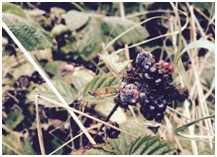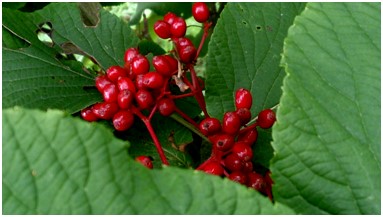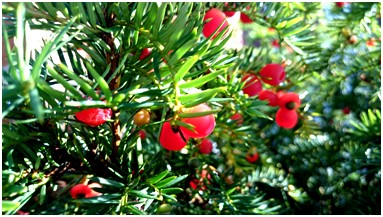What is a Berry?
The word berry in common usage refers to small, soft fleshy fruits found primarily on creeping plants or vine plants (strawberries, blackberries, goose berries) small bushes (raspberries, blueberries) and trees (mulberries). Botanical references would class most of these as compound fruits, and things such as stone fruits and tomatoes as berries.


It is important to be aware of this difference, for both practical and research purposes. By understanding the botanical terms for what are commonly called berries, you can research more efficiently; you will have a better understanding of what you are looking for within botany texts. Botanical terms are also important, especially when dealing with people from other areas, both nationally and internationally. Similar common names are used for different fruits, and some fruits will need description (i.e. Chinese gooseberry is also commonly known as Kiwi fruit. The fruit is actually a simple fruit in the berry family).
As with all branches of horticulture, the terms used in common language are often quite different to what is botanically correct. This is the case with berries.

Fruits are classified by the type of flower from which they arise, the number of ovaries needed to create the fruit, as well as by their physical structure of seed, flesh and outer skin. Fruits are divided into two major types.
- Simple fruits - those that come from a single ovary.
- Compound fruits - those that come from several ovaries.
Simple Fruits
Simple fruits include everything from vegetables and nuts to stone fruits, citrus and melons. The pericarp fleshy fruits, or those most commonly known as fruit, include drupes, berries and pomes.
The botanical definitions for these are:
a) Drupes - a simple fruit, normally with a single seed covered with a thick skin (endocarp). The seed is covered with a fleshy mesocarp and thin skin (exocarp). Drupes include almonds, cherries, peaches and olives.
b) Berries - a simple fruit with many seeds. Both the endocarp and mesocarp are fleshy, while the exocarp (skin) can be either very thin or very thick. Berries include tomatoes, citrus fruits, cucumbers, bananas, dates, grapes and watermelons. (Some sources list citrus as hesperidium and cucumbers, melons and squashes as pepo. Both hesperidiums and pepos are sub-groups of berries).
c) Pomes - a simple fruit from an inferior ovary. Pomes include pears and apples.
Compound Fruits
Compound fruits are many true fruits attached to or within a single receptacle, so what would commonly be considered one piece of fruit, is really many pieces. This group includes aggregate fruits and multiples fruits.
The botanical definitions for these are:
a) Aggregates - a cluster of fruits that are borne of many ovaries contained within a single flower. The fruits are held together by a receptacle with fleshy pith. Strawberries, raspberries and blackberries are all aggregate fruits.
b) Multiples - the fruit from many ovaries of several different flowers on a common stalk will form a multiple fruit. The true fruits are contained in a fleshy receptacle, as with the aggregate fruits. Figs, pineapples and mulberries are multiple fruits.

These are notes from our Berry Production course.
Also now available - Proficiency Award in Self Sufficiency and Berry Production
LEARN WITH ACS
If you are interested in growing berries either as a hobby or professionally, you will find our courses offer a wealth of learning. Our selection of horticulture courses are designed to offer study options to students with different levels of knowledge and experience, and with different personal or business goals. If you want to study specific subject areas, such as Berries, we offer specialist course options too.
All our courses are studied by distance learning - either online or by eLearning - meaning you can study where and when you choose. Many courses also include practical elements to assist with and reinforce the learning process.
If you have any questions about any of our horticulture courses, please do get in touch with us - submit your questions and connect with our expert horticulture tutors. They will be pleased to help you.
[14/03/2025 21:31:40]
More from ACS
Over 150 short courses, certificates and diplomas covering landscaping, crops, plants of all types and general gardening.
Directory to short courses and certificates -hydroponics for amateurs and professionals